“This terrible war brought Ukrainians together and united them.” Interview with the Mayor of Kramatorsk
Oleksandr Honcharenko on how Kramatorsk, which has become a major transport hub of the Ukrainian resistance, is preparing for defence and partially restoring peaceful life.
Text by: Dmytro Syniak
“The night after the interview was scheduled, Kramatorsk was hit by a missile. Oleksandr Honcharenko posted about this on his Facebook page. “Night air-missile strike on Kramatorsk,” he wrote. “‘Liberating’ us from our industry. According to preliminary information, there are no victims, but two enterprises of the city suffered serious damage...”
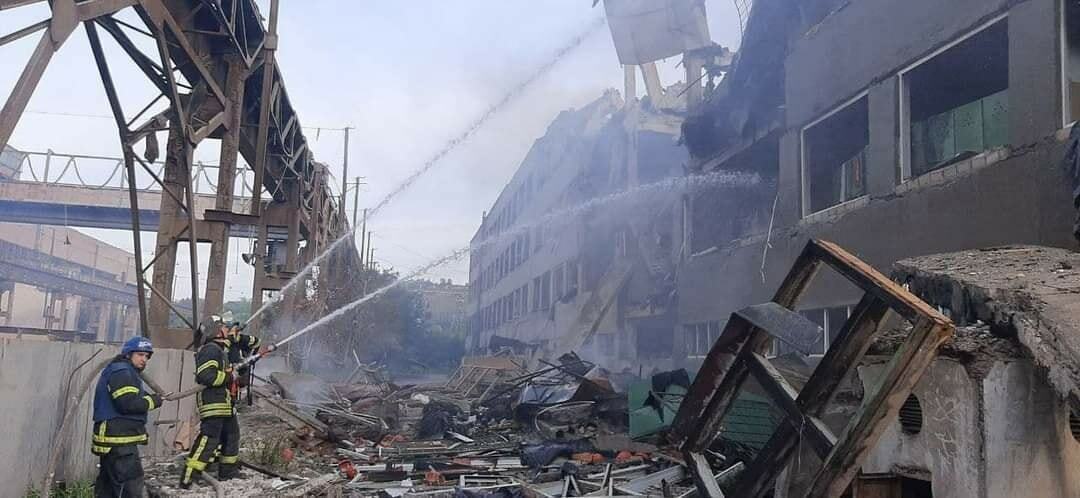
Night air-missile strike on Kramatorsk on June 5
Missiles and shells can be heard all around the city all the time. They explode near Bakhmut, Soledarsk, Sloviansk and Lyman. Kramatorsk itself is constantly under attack by Russian aircraft and artillery. Two half-tonne Russian bombs fell on the city centre on May 5; Russians bombed a shop at a city factory on May 6; a half-tonne bomb fell on the village of Malotaranovka on May 7; a Russian missile hit an unfinished construction in a Kramatorsk neighbourhood, and another exploded in the private sector on May 25; another missile was shot down over the city by Ukrainian Air Defence units on June 3. Because of this, Oleksandr Honcharenko, Mayor of Kramatorsk, feels like he’s on the front line. He told Decentralization about the situation in the city and how its defence is being prepared.
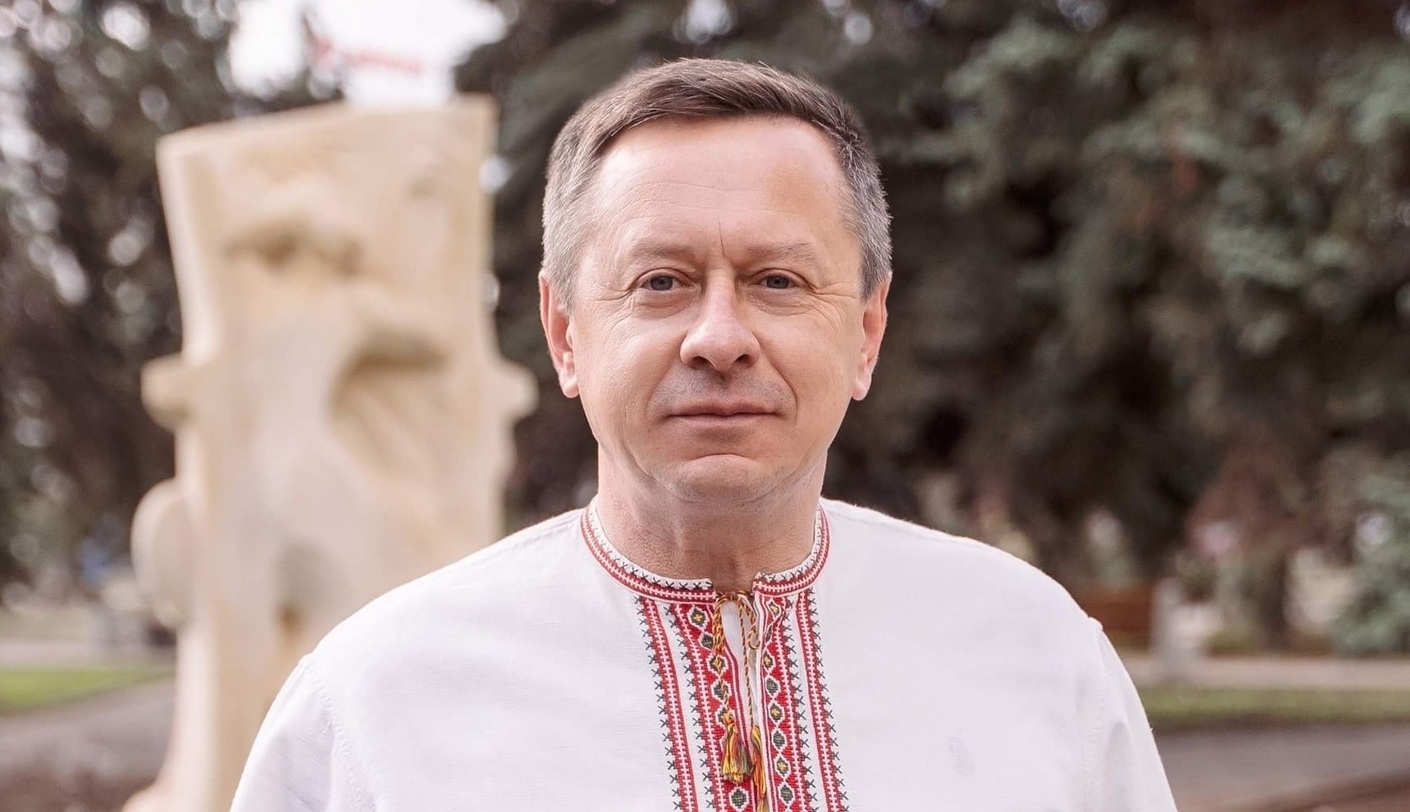
Oleksandr Honcharenko, Mayor of Kramatorsk
What were the first days of the war like for you?
We were expecting the war, because here, in the Donbas, its approach had been felt for a long time. We were mentally prepared for hostilities, remembering the events of eight years ago. So there was no panic. Although we did not think that there would be a full-scale Russian attack on the entire territory of Ukraine. We worked, strengthened our defences and prepared to defend our city. Many locals prepared Molotov cocktails, wove camouflage nets and more.
What is happening in Kramatorsk now?
The enemy is shelling neighbouring cities, especially Sloviansk and Lyman, which are currently experiencing the brunt of it. Bakhmut, Sviatohorsk and Soledar, 40-45 km from Kramatorsk, are also under fire. The shells exploding there are well heard in our city, and we understand that our neighbours are in a bad situation.
The worst blow to Kramatorsk was on April 8 when a Russian Tochka-U missile hit the crowded train station. Tell us about it.
A week or two before that, the Governor of the Donetsk region Pavlo Kyrylenko, as well as almost all mayors, called for maximum caution, emphasising the increase in strikes and shelling by Russia. Kramatorsk was then attacked every 3 to 4 days. There were both missile strikes and air strikes. And then this horror happened. Russia’s Tochka-U missile killed 59 civilians, 38 of whom died on the spot. At that time, Kramatorsk railway station was a sort of evacuation hub for Luhansk and Donetsk regions, with all trains coming here. In general, 4,000 to 8,000 people a day left Kramatorsk by rail. We managed to evacuate about 75,000 people by rail alone. And here was this missile strike. It forced even those who had sworn against leaving their community to evacuate.
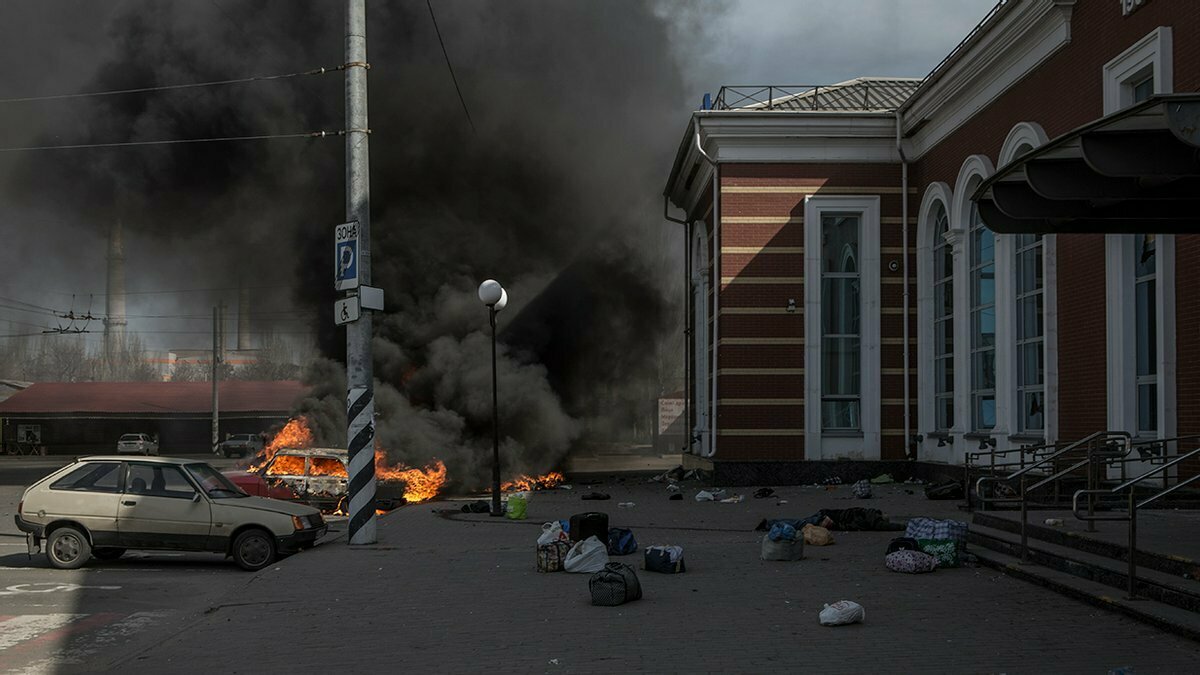
Russia’s Tochka-U missile station killed 59 civilians at the Kramatorsk railway
How many residents remain in Kramatorsk now?
About a quarter, 55,000 to 60,000 people. Before the war, the population of Kramatorsk reached 220,000 people. In recent weeks, 10,000 people have unfortunately returned. We calculated this using the data provided by mobile operators, the amount of garbage and the water consumption. What do I mean by ‘unfortunately’? The more people stay here, the more problems we will have to solve in case of escalation of hostilities. We are talking about medical and humanitarian aid, the provision of utilities and more. We already have power and water outages, and there is no gas at all because the main gas pipeline has been hit and cannot be repaired due to intense fighting. And our own gas reserves ran out on May 23. Therefore, more and more residents are complaining about the poor quality of some services, and more and more people need to be explained why we work the way we do. Moreover, the fewer people, the lower the risk of death or injury in case of escalation of hostilities.
Why are people returning to the dangerous frontline city?
Some come back just to take summer clothes, while others want to check up on their homes, to fulfil some request of friends and relatives. Still some do not wish to live relying on the kindness of others, missing their homes. According to our estimates, 10-15% of those who returned want to work because they see that nothing ‘extremely terrible’ is happening in the city. By the way, healthcare institutions have been up and running again, as some doctors have returned from Dnipro and other neighbouring cities, because they were unemployed there. Now in Kramatorsk, they can earn 50% more than in peacetime.
How do you fund this?
Bonuses come from budgets of different levels, mostly from the local one. The main thing is that we do not exceed the established limits, that is the target expenditures remain at the previous level. This is achieved through a drastic reduction in the number of employees. For example, public utilities now lack 30-40% of staff. And instead of 30 drivers, now garbage is taken out by 8. Accordingly, the load on the rest of the staff increases. I think that doubling the salaries of the rest is quite reasonable.
Does this mean that it is the local government that initiates the increase of salaries for employees of city institutions?
Each utility company decides on this separately, based on the amount of revenue and its own budget. The city council approves this if it sees that a certain company can deal with the additional financial burden and does not exceed the previous targets. If salaries are not raised, the city life may collapse. Trolleybus drivers, for example, received UAH 15,000 before the war, and now their salary is UAH 18-20,000. We have only 30 such drivers left, despite the fact that all passenger traffic in the city from February 25 is free. We can’t transport people by bus due to fuel shortages, so a lot depends on trolleybus drivers. We have provided several cars with special batteries that allow them to have some autonomous electric range. Such trolleybuses travel to nearby villages, and they are now the only means of connecting these villages with Kramatorsk.
If the city budget has funds to increase salaries, then there is some tax revenue, right?
Budget targets are met less and less every month, but due to the ‘rich’ January and February, the overall decline is relatively small, an average of 80% over five months. That is, there is still enough money, but no one knows how much longer the war will last. If the situation remains at the current level, we will receive about 50% of budget revenues in the summer. There should be enough by the end of the year, and then our industry, which has been idle since March 1, should restart. Many companies pay salaries to their employees, so we receive personal income tax from them. But if industrial enterprises do not at least partially resume work in the fall, we may start having financial problems.
Are small businesses operating in the municipality? Are the stores open?
About 10% of small businesses work, mostly small groceries. In general, probably 30-35% of grocery stores are open, and city ATMs are replenished with cash. About 20% of pharmacies also operate. Yes, there are some problems, such as diesel fuel or gasoline shortages some days, but you can still buy them once every three days. I do not see any other critical problems at the moment.
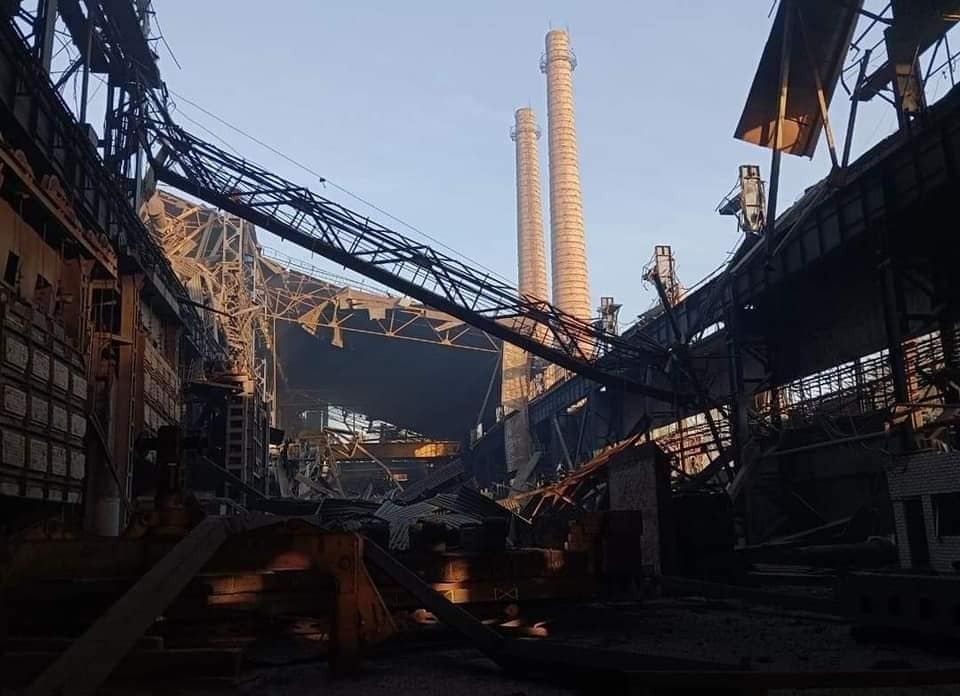
Russians destroy the plants of Kramatorsk with missiles and shelling
Does the municipality receive humanitarian aid?
About 70-75% of those who are living in Kramatorsk now are the elderly, the retirees. Humanitarian aid for them is a kind of compensation for rising food prices. We receive it through the Office of the President, as well as from various European foundations and NGOs. Of our 55,000 residents, about 40,000 have received this assistance at least once. We issue 500-600 packages daily, registering each receiver’s place of residence, passport data, etc. to prevent abuse.
Was a Territorial Defence unit created in Kramatorsk?
Yes, of course, and it is very strong, being one of the units of the Armed Forces of Ukraine. In addition, we have created a volunteer battalion at the Kramatorsk City Council, which, while not being part of the Armed Forces, protects critical infrastructure, such as a filter station, humanitarian aid warehouses, banks, post offices and more. The guys do it for free, receiving increased humanitarian aid from us instead. Unfortunately, the law does not allow funding for armed volunteer groups from the local budget. The Ministry of Defence cannot finance them either. I think the Verkhovna Rada will have to solve this issue somehow if the war drags on for much longer. Many in our volunteer battalion are individual entrepreneurs who lost their jobs due to the war. And they suspend their individual entrepreneur status now because not all databases work in the combat zone. Meanwhile, according to the law, an individual entrepreneur cannot be employed by local self-government. So they are at an impasse.
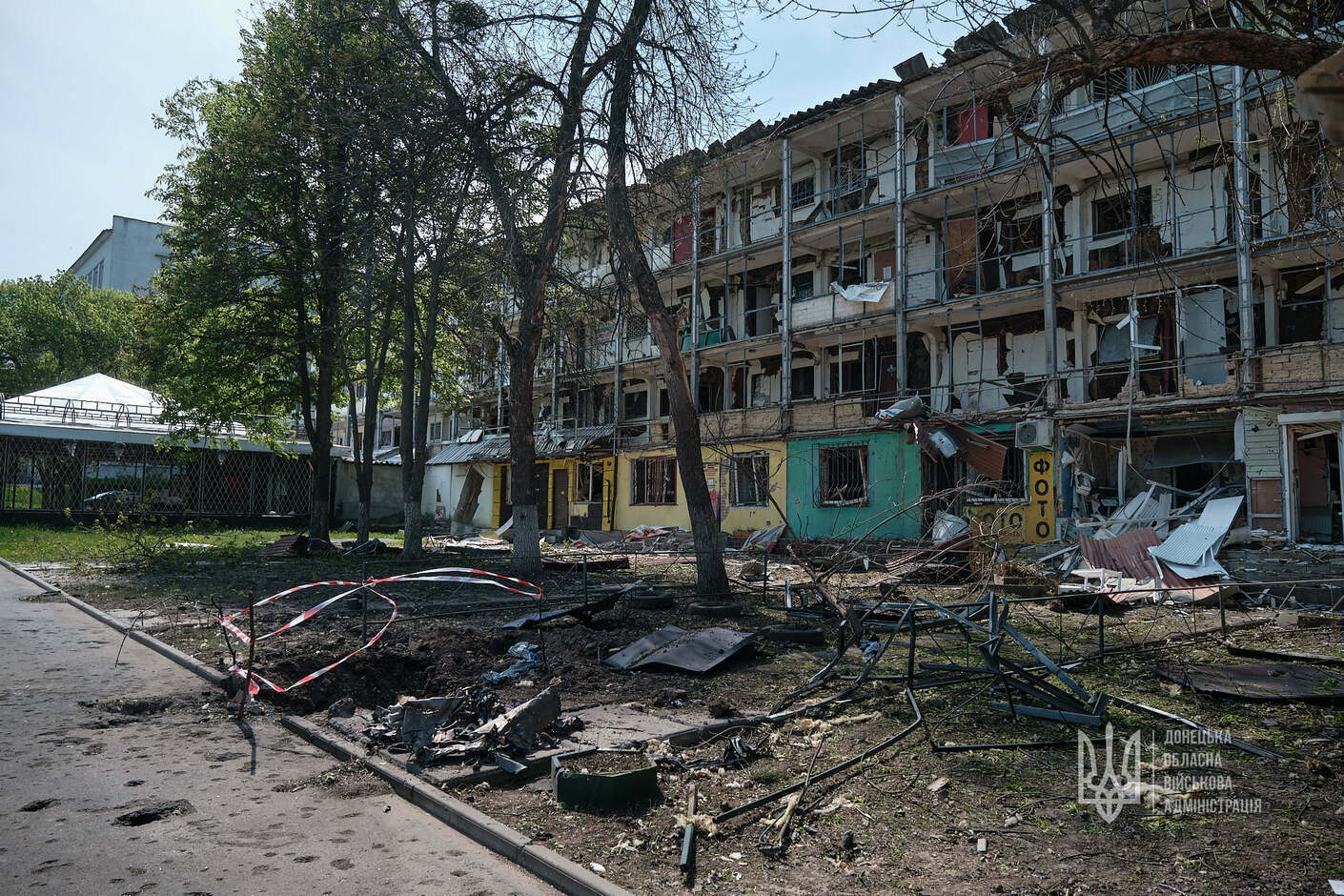
Residential buildings in the city were repeatedly shelled
Is crime on the rise in the city?
On the contrary, crime rates are decreasing. This is due, firstly, to the departure of 3/4 of the city’s residents, and secondly, to a large number of armed troops in Kramatorsk. Thieves understand that these should not be messed with. The third reason is a ban on the sale of alcohol.
Is there pro-Russian sentiment in Kramatorsk?
It would be a fair estimate to say that 8 years ago, when the Russians, led by the terrorist Girkin, invaded Kramatorsk and Sloviansk, 35-40% of the population were Russia sympathisers. After that, however, when the city was liberated from the so-called ‘Donetsk People’s Republic’, even those who dreamed that the Donbas region would be annexed by Russia, started to feel disillusioned. Now no more than 2-3% of our residents tolerate Russia. In the queues for humanitarian aid, these people, often intoxicated, even threaten others. “Once our guys come, you will be dealt with,” they would say. But everyone else reacts to that in such a way that the only option for them is to run for their lives. People don’t even have time to take their pictures. There are few such cases anyway.
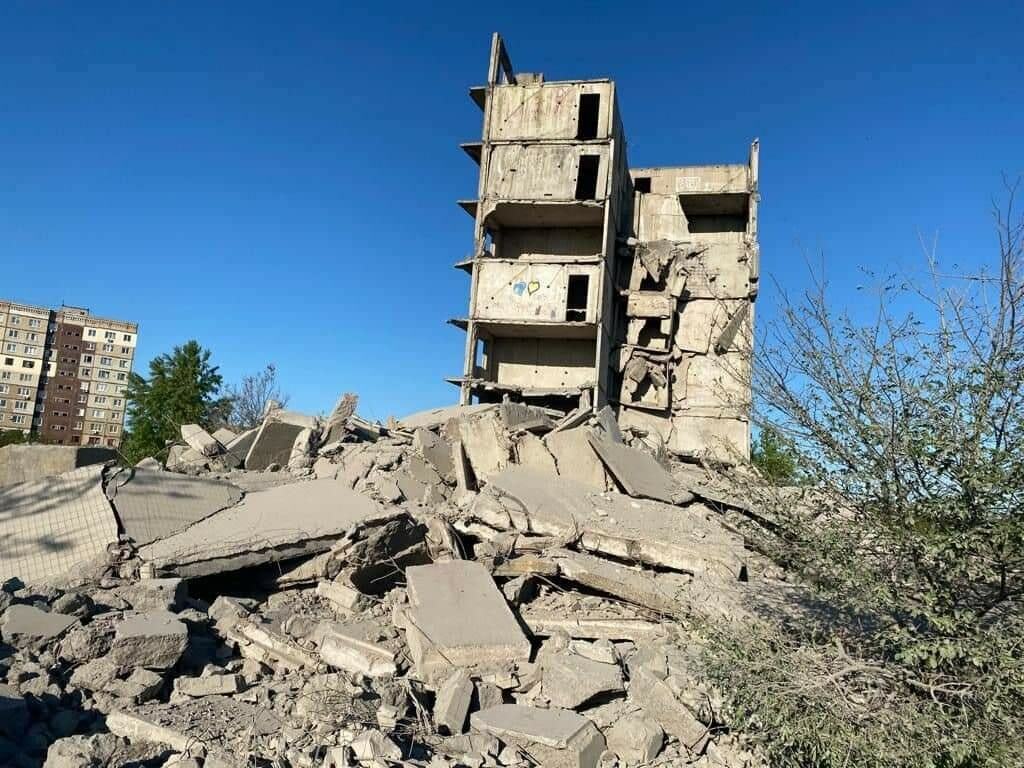
While suffering, Kramatorsk stands strong and believes in victory
Are deputies of the city council gather for the meetings?
This is not necessary at the moment. Because the decisions needed to change the allocation of finances during martial law can be made by the decision of the executive committee, and made remotely. But if the deputy meetings are required, the Regulations of the Kramatorsk City Council also provide for holding them remotely. At the very beginning of the full-scale invasion, we decided on this at the meeting and amended the Regulations.
What challenges do you face now as the head of the Kramatorsk City Council?
We need to organise more or less comfortable living for people, provide them with everything they need and make our entire infrastructure work. First of all, we are talking about water and electricity supply. This is our priority today.
Do sister cities help the Kramatorsk municipality?
We received the most help from Khmelnytskyi, which we now consider our sister city, although we did not have time to sign the relevant documents. The mayor of Khmelnytskyi visited me and brought an entire truck of generators about 3 weeks ago. Such a royal gift! I am also in constant contact with the mayors of Vinnytsia, Zhytomyr, Kharkiv, Dnipro and many others. This terrible war brought Ukrainians together and united them. We see this unity in how people interact with each other, in the way our IDPs are received throughout Ukraine. Nobody perceives them as strangers. Nobody divides Ukraine into ‘Muscovites’ and ‘Banderites’.
What impressed you the most during the 100 days of the war?
Fortunately, we have not had direct hostilities, which usually reveal heroes and traitors and often become the source of many stories. However, being a hero does not only mean destroying the enemy. The driver of a garbage truck who works under fire, risking his life, is also accomplishing a heroic deed critical to the war effort. So everyone has to do their job, and that will be their contribution to the future victory. I believe in our victory, in our Armed Forces, and I am positive that we will rebuild our state to be even better than before the war. There are all prerequisites for this. We see how highly motivated the fighters of the Ukrainian army are, understand how important the battle for the Donbas region they are fighting in is. The Donbas cannot be lost, as it will open the way to invade other territories of our country. Fortunately, everyone realises this, from the President to the average citizen. Ukraine must emerge victorious and defend its independence.
P.S. Oleksandr Honcharenko’s Facebook post dedicated to the Hundred Days of War
We have endured 100 difficult days of the Great War...
Although, in fact, we have been holding on for 8 years. Russian soldiers are killing Ukrainians, ruthlessly destroying our cities, trying to steal our future. After the missile strike, it moved on to Sloviansk, then to Pokrovsk, and continues from there.
Their goal is to break us mentally and destroy us physically. No one is spared, from unborn children and their mothers to people who survived the horrors of Nazi concentration camps.
But with each passing day of the war, our nation is only getting stronger. Our Victory is hardened in this terrible crucible.
The war rages on. We know that the people of Kramatorsk are waiting to return home, and Kramatorsk is waiting for you. It will wait for everyone, but only after the victory.
And then...
We will throw a concert at Peace Square. We will go to the flagpole in the Jubilee Park, ride the merry-go-round or the roller coaster, enjoy the sunset from the Ferris Wheel. We will walk through Kramatorsk at night, sit, wrapped in warm blankets, at the embankment near Bernatskyi Garden and then go to the windmills to meet the dawn of a new peaceful day. At the weekend, we will take our bicycles to Bilokuzminivka. And in the summer, we simply must go to the Blue Lakes a few times, or at least to the Solionka Spring. We will tell the guests of the city why the Lazurny district is called ‘Chornobyl’ and about the City Day motocross... And we’ll be sure to continue the tradition of the open-air prom.
We will go on vacation to the Crimea, Kyrylivka or Berdiansk, support the national team of Ukraine in the Donbas Arena, celebrate the Luhansk City Day, go to see the performances of the revived Mariupol Drama Theatre. We will eat Kherson watermelons and Melitopol cherries.
And in a moment of silence, all of us together will remember all those whose lives were taken by the war. Both Kramatorsk residents and those who were waiting for the evacuation train at the train station on April 8. Minibus near Volnovakha. Shelling of the Vostok district in Mariupol. Tens of thousands of civilians. And, of course, our soldiers who give their lives every day, protecting our peaceful sleep.
We have already held on for 100 difficult days of the Great War, and we will overcome all the trials that fate has prepared for us on the way to our Victory.
Every day, we work to bring it closer with every means possible. Some of us became volunteers, and some simply evacuated in time, because every life is priceless.
We will overcome everything together.
Kramatorsk.
Ukraine.
Tags:
war stories war report war stories special project
Область:
Донецька областьГромади:
Краматорська територіальна громадаSource:
Пресцентр ініціативи "Децентралізація"
20 February 2026
Місцева статистика: Як перетворити розрізнені...
У Києві відбулася стратегічна зустріч "Статистика громад", організована Державною службою статистики України за...
20 February 2026
I_CAN launched a nationwide rollout of its Public Investment Management Training Programme for local governments and...
20 February 2026
Language of Development Part 2: Funds and Instruments of EU Cohesion Policy
Language of Development Part 2: Funds and...
With the “language of development”, we describe not only the goals and principles of EU regional policy, but also...
19 February 2026
Анонс: вебінар «Обговорення змін до Порядку...
Які практичні кроки мають здійснити керівники та педагоги, щоб ефективно впровадити ключові зміни до Порядку...